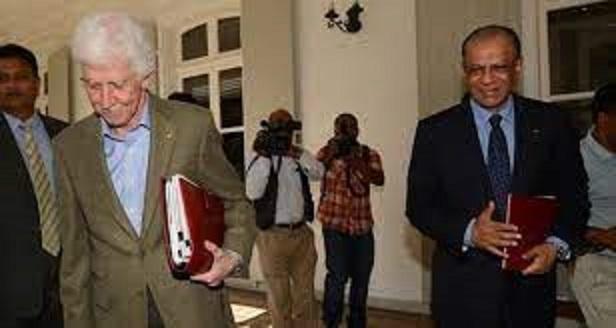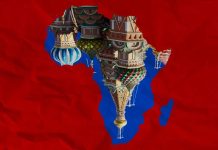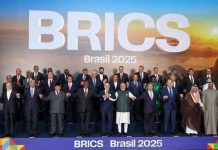Africa-Press – Mauritius. The political alliance between the two major center-left and liberal parties, between their two electorates, is historic and probably a source of hope for a large majority of our citizens
A few months ago, we wondered if, with the personal alchemy of their leader helping, the two great political vessels that are the Labor Party and the MMM would find the necessary resources of flexibility, understanding and reciprocal intelligence. to manage to moor in order to guide the country, together, towards the future.
There were many reasons for this agreement, while recognizing that it would be neither simple nor easy to tune the violins when both had to accommodate their strengths, approaches and supporters to the difficult decisions of ‘a balanced sharing, that, immediate, of the investitures and that, behind the scenes, of a second Republic.
It is not without reason that the gestation was long and strewn with pitfalls, episodes “on-off”, but, except unimaginable macadam, it seems that we are there in this agreement which intends to start a new chapter in the history of the country. This is a historic agreement in several ways. First of all, Mr.
Bérenger has never made a secret of his admiration for the Labor Party’s long and difficult struggles for democracy, workers’ rights and social justice, and also for Navin Ramgoolam’s dedication to bringing together the different communities, erase the structural inequalities of history, open up the field of opportunities and modernize the country and its institutions.
It is not offending him to recognize that, having co-founded the MMM on trade union activism, the idealizing and protesting wave of the seventies, he made it, from the nineties , no doubt, under pressure from its own lieutenants, a party that aspires to be in the business of managing the city, in partnership, rather than as a permanent and sterile opposition force, heir and prisoner, willy-nilly, anti-independence movement with communal reflexes.
The alliance with the MSM in 1990 was the first attempt, with eager MMM lieutenants even planning to marginalize Berenger. “Not of my doing” will say this one, but its rather inexperienced alliance, with the PTr in 1995, will not last long, giving way to the MedPoint agreement with the clan of Jugnauths between 2000 and 2005.
Since 2005, a new generation of MMMs, not to mention a few old wolves, have paid a heavy price for an ill-inspired economic and social policy between 2000 and 2005, and have been condemned to wandering, gradually removing certain fringes of the population.
of the MMM. Today the party finds itself confined to a few purple city “bastions” and, even in alliance with the MSM, has only struggled to win a small majority of urban areas in the last municipal elections.
The PTr, in power since 2005 and the engine of successive alliances, remains fairly firmly anchored, even though it is undoubtedly suffering from the erosion of power and a largely hostile private press.
The conditions were, it seems, ripe for a new, more mature, wiser and, at the same time, more daring foundation of the PTr-MMM alliance of 1995. Wiser and more mature, because there is reason to believe that Navin Ramgoolam and Paul Bérenger have, without doubt, each on their own, learned the lessons of recent history.
That it is on the strength of past experiences that they have today drawn the outlines of an alliance suited to the temperaments of the two political monsters that they are but also ensuring a convergence of the interests of their party and their respective electorate.
In this sense, it is a historic alliance, which has put all the chances on its side to succeed. More daring: if the conditions were met, a major click was still needed and it seems, in retrospect, that it was Bloc 104 which provided it, despite itself, we can imagine.
The discussions and joint negotiations between purple and red leaders and legal experts to revamp our Constitution, with the integration of the Best Losers in an electoral reform, realistic and achievable, at the same time augured for a broad discussion between Navin Ramgoolam and Paul Bérenger on the outlines of a Second Republic, prefiguring this political alliance desired by the two leaders.
Everyone had to put a little water in their wine, but the stakes were high: to make us switch from a Westminsterian parliamentary regime, with, as has often been criticized, too much power concentrated in the Prime Minister’s office, towards a a more balanced semi-presidential regime, “Mauritian style”, without leading the country to an unprecedented experiment carrying risks of instability and conflicts at the top of the State.
Find this clever, dual-level institutional balance between two new poles of power to come (a Presidency elected by universal suffrage and a Prime Minister also from the ballot box) and, at a second level, between the PTr and the MMM, (in the framework of the only political alliance likely to obtain the majority required to bring this project to fruition), has not been easy, it seems.
Everyone will find fault with one point of detail or another, and some in the Sunday press have immersed themselves in it, looking for the little beast. Disappointed supporters of the few opposition forces were loud or tearful on private airwaves.
The attitude of the two leaders at their joint press conference, resolutely turned towards the future of the country, made a few wink, pretending to ignore that a new political alliance often wipes out past criticisms that some and the others (MSM, PMSD, MMM and PTr) threw themselves in the face for thirty years.
Faced with the audacity of the prospects for a new Republic and its contours (on which everyone can legitimately have an opinion or suggestions), faced with the historical convergence between two major electoral blocks of our political landscape, these are reflexes of an old time.
The two leaders had, moreover, taken the trouble to reassure on the points raised (fears of dictatorship, repression, single thought, arrogance, personal sharing of power .
.
.
). The few hundred “likes” and salonnards, occupying social networks and roaring on the airwaves, represent only a very modest electoral force.
The respective executives of the two parties having come out overwhelmingly in favor of the alliance, “at the end of the day”, as the Englishman says, it will be up to the electorate to decide at the next popular consultations and to gauge the scope, the relevance and stability of this alliance which heralds a transformation of our institutions and our voting methods, with electoral reform and a rebalancing of powers between the Reduced and the Treasury Building.
In terms of the alliance between parties, the one whose main lines were drawn to us last Saturday, it seems capable of satisfying the mauves and reassuring the cautious of the PTr, who could have been worried about this announced sharing of the investitures electoral and ministerial responsibilities in a red-purple government.
Any political alliance inevitably involves concessions on both sides to achieve goals larger than egos and personal ambitions, however legitimate they may appear in the subjective opinion of those concerned. It is also the opportunity for a renewal of the political class and the seniors who have been too many fights.
Finance, Interior and Public Security will remain under the responsibility of the PTr, international diplomacy becoming, as in France, in a way, a privileged area of the new semi-executive Presidency in close collaboration with the future PM. This is enough to reassure all of our foreign partners and our traditional friendly countries.
Some echoes state that Finance, whose weight and screed were excessively heavy on too many areas, would finally be split in two, to return to the formula of Sir Seewoosagur Ramgoolam with an important ministry of Planning and economic development.
It would be a good thing for the country and its economic and financial governance. We should take the opportunity to look at the attributions and responsibilities of the Management Audit Bureau or the follow-up to Audit reports, depicting, year after year, the excesses or laxity of higher levels of administration.
The country, the private sector, the big projects to come, the big projects of the investors awaited the outcome of the political koz-koze with a certain impatience.
They can only rejoice at an outcome that seems both reassuring and daring, the stability and visibility of the political horizon allowing the economy to relaunch to other more ambitious horizons.
The two political leaders will certainly go down in history through the front door but, well beyond this, it is a matter of moving us to another institutional level that will be a legacy to future generations.
The political alliance between the two major center-left and liberal parties, between their two electorates, is historic and probably a source of hope for a large majority of our citizens.
Political opponents are called upon to heighten their visions and alternative proposals, if they are to remain credible in the face of what could be a red-purple tidal wave.
For More News And Analysis About Mauritius Follow Africa-Press







